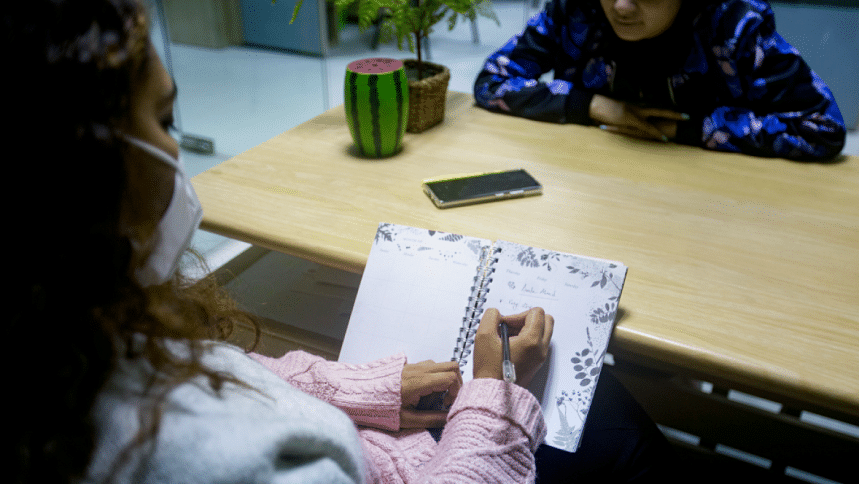Why you should go to therapy

What do you need therapy for? You have probably started looking for a "justified" answer to this question, racking your brain for a strong valid reason that will seem viable enough, or does not sound like an excuse.
Therapy, or any sort of help for mental health issues, may be long neglected concept in Bangladesh. But the need for it is long overdue.
Through pop culture or the media, pretty much every single one of us young people has come across the idea of therapy, and many of us have considered giving it a shot. However, a regrettable majority out of this group of people have not been able to show up to receive any kind of help.
For young people living at home, therapy is not accessible without your parents supporting you, or at least knowing about it. The concept of mental health is approached differently by us, the young generation, and our parents and grandparents, the older generations.
"One big struggle I face is actually gathering the energy to go up to my parents and tell them that I would like to try therapy since they will most likely take it as a personal insult. My parents have a certain reluctance to not only take me to therapy but even acknowledge its existence," shares Zuhayer Khan, a grade 11 student at Scholastica, on why he had never been to therapy despite considering it.
"If I do mention the desire of therapy to them, I would be met with a tedious process that may end in me getting therapy. But I do not feel going through all that would be worth it."

Brac University student Nusrat Chowdhury* thinks that the hectic schedules of young people are another prominent barrier to receiving therapy.
"When you need to go to therapy sessions regularly, oftentimes your appointments may clash with class or work. And due to our mindset around mental health and how it is not yet considered a valid reasoning we can give to our teachers and employers, a lot of people feel guilty about missing work and let go of therapy altogether," she says.
Given that many young people feel the need to go to therapy because they feel anxious and overwhelmed due to their workload, it is important to take some time out of work to care for their mental health, otherwise, it often deteriorates more over time and jeopardises the work they were worried about to begin with.
Naomi Sharif, an HSC graduate from Viqarunnisa Noon School & College, shares how therapy turned out to be a very rewarding initiative for her. She explains, "I was suffering from hopelessness and weight loss throughout 2020. I missed classes and the recordings kept piling up. Eight months in, my best friend pushed me to go see a professional and get myself assessed. I tend to avoid talking about my feelings, but I'm glad I went to therapy. The first thing I told myself after that was that I was not at fault for my months of inefficiency."
Soon, Naomi started considering therapy sessions and caring for her mental health as a lifestyle change, and her wellbeing improved considerably. She considers any progress to be beneficial, however small it may be, and practices setting small realistic goals for herself.
Naomi and her friend eventually founded the mental health awareness organisation Mindspace, which recently launched "Vent by Mindspace", a psychological help hotline service supervised by professionals.
Even if we do not need help ourselves, Naomi's story tells us the importance of being informed about symptoms of illness so we can detect them in our close ones. A small nudge on our part, encouraging our friends to go see a professional, can go a long way in improving the quality of their lives.
Furthermore, the thought of the costs is something that keeps a lot of people from considering therapy, and according to Dr Sayedul Ashraf Kushal, lead psychiatrist and managing director of Lifespring, we often consider caring for our mental health to be a luxury, even though consequences of untreated mental illness is lifelong.
"For common mental illnesses that afflict the youth, such as depression and anxiety disorders, if you complete the suitable course of treatment alongside actively working towards getting better, the process will not be very lengthy, and therefore not require you to bear its costs for very long. If finances are a barrier, consider public hospitals such as Dhaka Medical College Hospital, which provide generally affordable mental health services, relative to private hospitals or organisations," comments Dr Kushal.
Asked about his professional opinion on how parents and their children should approach the idea of therapy, he adds, "When your child asks for help, never tell them that you have also passed the stage of life they are at, because you have not. The world was not as globalised or fast-paced before. Very young kids are exposed to things they are not prepared for, are not old enough for, and there is little we can do about it."
Currently, one in five people are neurodivergent, he mentions. None of them are 'crazy' or 'insane'. The treatment of mental illness is somewhat similar to improving the circumstances the child is living in, relative to before. As parents, there is no need to take personal offense when the children require help.

On how to approach therapy to benefit most from it, Dr. Kushal says, "As a patient, for therapy to work, a bit of effort and willpower is required on your part."
Therapy is an option worth considering; an option worth the time and effort it would take for giving it a shot. Do not go in expecting to find solutions overnight, however, it does empower you to take steps to go out there and seek the help.
So, do you need therapy? There is no need for an answer. You can go to therapy for no particular reason at all. Life, with all its uncertainties and complications, is enough.
Even if you do not think you have a mental illness but have been grappling with uncertainty for long enough for it to be daunting, going into therapy can present you with fresh new perspectives on tired old problems.
These are difficult times, it is not unusual to struggle. We have been stuck in our houses long enough for it to be forgivable to get stuck in our minds.
*Name has been changed upon request
Amrin Tasnim Rafa is always confused, it's literally her dominant personality trait. This is maybe her email, she can't be sure: [email protected]

 For all latest news, follow The Daily Star's Google News channel.
For all latest news, follow The Daily Star's Google News channel. 








Comments